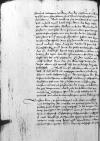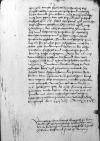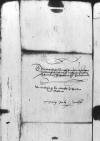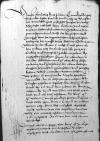Nachdem wir verruckter zceitt auss hoher unserer unvorbeÿgehenlicher notturfft denn ersamen unnd weÿsen unsernn liebenn besonndern unnd gefatternn ⌊burgermeisternn unnd rathe der koniglichenn stadt Danntzigk⌋ vonn der ungewönlichenn beschwerlichenn verlegung des marckts unsers stetleins ⌊Soldaw⌋ genn ⌊Mlava⌋ in der ⌊Masaw⌋ (welchs so woll eÿnem als dem andernn orth der landt ⌊Preussen⌋ gantz verfencklich unnd untreglich) zuerkennen gebenn. / Mit angehefftem genedigem sÿnnen das nebenn uns sie dawider sollicitirenn unnd zu abwendung solcher neuerung unnd zuerhaltung der altenn loblichen langhere geprachtenn gewonheitenn unnd gerechtigkeÿtenn / vleiss anwendenn woltenn helffenn etc.
Als habenn sie uns hinwider durch ir schreÿbenn vermeldett, / das sie solche gemeÿne anligenndt in jungster gehaltener ⌊tagfarth⌋ Stanisslaÿ zu ⌊Marienburck⌋ beÿ E(uer) L(ieb) unnd denn andernn der ⌊koniglich(en) rethenn der lanndt Preussenn⌋ mit vleiss gefurdertt / unnd also viel / erhaltenn / das ⌊konig(lich)e ma(ieste)t zu Polann⌋ etc. unnser genediger herr unnd freuntlicher lieber ohem, / durch E(uer) L(ieb) unnd die andernn herrnn rethe, / domit solche neuigkeytt abgeschafft / ersucht wordenn. / Wes aber derhalbenn vonn ⌊irer ma(ieste)t(en)⌋ fur antwortt erhaltenn, / were inenn vonn E(uer) L(ieb) mitgetheilt, / des sie uns dann auch copienn ubersende[...] stain⌈[...][...] stain⌉t etc.
Dieweyll aber vonn hochgemelter ⌊konig(liche)r ma(ieste)t⌋ in solcher gegebener antwortt fur die hochstenn ursachenn angetzogenn wirtt, / als soltenn irer ma(ieste)t(en) zcolle offtmals  BCz, 1606, p. 494 dorumb betrogenn werdenn, / das die ochssenn / so auss de[...] hidden by binding⌈[...][...] hidden by binding⌉ ⌊Podolienn⌋ getriebenn / fur Masauerisch gehaltenn wurdenn etc. Nun wirdt es sich versehenlich ÿm grun[...] hidden by binding⌈[...][...] hidden by binding⌉ viel anderst unnd dieses befindenn / das keÿn ochss oder andere war genn ⌊Soldaw⌋ auss der ⌊Masaw⌋ unnd sönstenn / man habe dann zuvornn denn gepurlichen gewönlichenn zcolle, / wie wir bericht / davon abgelegtt / getriebenn unnd gepracht. / Donebenn habenn wir denn unsernn / ihm fhall / woe sich iemandts mit ochssenn unnd anderer whar, / durch die wiltnus heimlich durchschleiff(en) unnd domit die zcölle vorbeÿgehenn woll hidden by binding⌈[l]l hidden by binding⌉[...] hidden by binding⌈[...][...] hidden by binding⌉ das sie dasselbigk keynes weges gestattenn / solten, / auch inenn die whar daruber zunemenn. / bevelich auff[...] hidden by binding⌈[...][...] hidden by binding⌉ legtt / wie des auch gescheenn. / Zu dem wissenn wir nicht anderst dann das / das Masavische viehe / oder whar ebenn also wenigk als des Podolische des zcolls gefreÿhett. /
BCz, 1606, p. 494 dorumb betrogenn werdenn, / das die ochssenn / so auss de[...] hidden by binding⌈[...][...] hidden by binding⌉ ⌊Podolienn⌋ getriebenn / fur Masauerisch gehaltenn wurdenn etc. Nun wirdt es sich versehenlich ÿm grun[...] hidden by binding⌈[...][...] hidden by binding⌉ viel anderst unnd dieses befindenn / das keÿn ochss oder andere war genn ⌊Soldaw⌋ auss der ⌊Masaw⌋ unnd sönstenn / man habe dann zuvornn denn gepurlichen gewönlichenn zcolle, / wie wir bericht / davon abgelegtt / getriebenn unnd gepracht. / Donebenn habenn wir denn unsernn / ihm fhall / woe sich iemandts mit ochssenn unnd anderer whar, / durch die wiltnus heimlich durchschleiff(en) unnd domit die zcölle vorbeÿgehenn woll hidden by binding⌈[l]l hidden by binding⌉[...] hidden by binding⌈[...][...] hidden by binding⌉ das sie dasselbigk keynes weges gestattenn / solten, / auch inenn die whar daruber zunemenn. / bevelich auff[...] hidden by binding⌈[...][...] hidden by binding⌉ legtt / wie des auch gescheenn. / Zu dem wissenn wir nicht anderst dann das / das Masavische viehe / oder whar ebenn also wenigk als des Podolische des zcolls gefreÿhett. /
Auff unnser schreybenn aber an ÿr ⌊ko(nigliche) ma(ieste)t⌋ ist disse ursach nit angetzogenn wordenn, / sunder als soltenn newe beschwerung(en) an den grenitzenn den koniglichenn underthanenn aufferlegtt wordenn / zu abschaffung derselbenn hett man dass auch vornemen mussenn. / Nhu wissenn wir uns nit zuerinnern, das einige newikeitenn der orth vorgenomen, / ader imals derhalbenn beÿ uns ansuchung(en) beschehenn / Seind demnach erbottig, / wo dÿ erclerett uns aller unvorweisslichenn / gebur dorinn zu erh[...] hidden by binding⌈[...][...] hidden by binding⌉.
Nachdem dann (unsers besorgens) auss solcher newigkeytt mit verlegung des marckes / nit geringe zarrutung / gutther freuntlicher nachporschafft, / ja der ewigenn vertrege / zwuschenn der loblichenn ⌊cron zu Polann⌋ etc. unnd uns auffgericht / dessgleichenn beschwerlicher nachtheÿll / so woll konigklichs als ⌊unnsers theyls Preussenn⌋ ervolgenn mocht, / auch ⌊konig(liche)r ma(ieste)t⌋ ahnn irenn altenn gewonlichenn zcollen keÿne abpruch beschicht. / So gelang hidden by binding⌈[ng]ng hidden by binding⌉ [...] hidden by binding⌈[...][...] hidden by binding⌉  BCz, 1606, p. 495 ahnn E(uer) L(ieb) / unnser freuntlich nachparlich bith / dieselb wöllenn gemeinem guthen unnd wolfarth dieser lanndt zum bestenn, / auch uns zugefallen / nach irer hohenn von Gott begnadigter geschickligkeytt fur sich selbest beÿ ⌊konig(liche)r ma(ieste)t⌋ treulichen verfurdernn helffenn. / Domit ⌊ire ma(ieste)t(en)⌋ nicht zulassenn, / das solch unfreuntlich unnachparlich unnd beschwerlich vorhabenn / zu einbruch berurter vertrege unnd gutther nachparschafft hinfurter gestetett / sonnder mit koniglich(e)n bevelich als der genedige herr abschaffenn, / auff das beder seÿts landenn unnd leuten an der alt herprachtenn freÿheÿtt unnd nachparlicher hanndtierung / nichts enthcogenn. / Wie dan E(uer) L(ieb) nach irem tieffenn, / reÿffenn verstanndt dem woll weÿtere mass unnd extension zugebenn werdenn wissenn. /
BCz, 1606, p. 495 ahnn E(uer) L(ieb) / unnser freuntlich nachparlich bith / dieselb wöllenn gemeinem guthen unnd wolfarth dieser lanndt zum bestenn, / auch uns zugefallen / nach irer hohenn von Gott begnadigter geschickligkeytt fur sich selbest beÿ ⌊konig(liche)r ma(ieste)t⌋ treulichen verfurdernn helffenn. / Domit ⌊ire ma(ieste)t(en)⌋ nicht zulassenn, / das solch unfreuntlich unnachparlich unnd beschwerlich vorhabenn / zu einbruch berurter vertrege unnd gutther nachparschafft hinfurter gestetett / sonnder mit koniglich(e)n bevelich als der genedige herr abschaffenn, / auff das beder seÿts landenn unnd leuten an der alt herprachtenn freÿheÿtt unnd nachparlicher hanndtierung / nichts enthcogenn. / Wie dan E(uer) L(ieb) nach irem tieffenn, / reÿffenn verstanndt dem woll weÿtere mass unnd extension zugebenn werdenn wissenn. /
Donebenn / seintemall hoch und vilgedachter ⌊konig(liche)r ma(ieste)t zu Polann⌋ etc. antwortt, / das dieselb irem schatzmeisternn / dem herrenn ⌊Spitkovenn vonn Tharnaw⌋ umb gruntlichenn bericht vonn wegenn solchs verlegtenn marckts / geschrieben mit prengett, / unns im fall wan dieselb an E(uer) L(ieb) gelangenn thett, / des auch, / darnach ferner zurichten / verstendigenn. / Das sein wir umb E(uer) L(ieb) hinwider mit allem nachparlichem freuntlichenn beheglichenn willenn zuvordienenn urbutigk. /
Vonn Gotts gnadenn ⌊Albrecht marggraff zu ⌊Brandenburgk⌋, yhn ⌊Preussen⌋, zu ⌊Stettin⌋, ⌊Pomern⌋, / der ⌊Cassuben⌋ unnd ⌊Wenden⌋ hertzogk⌋, burggraff zu ⌊Nurmbergk⌋ unnd furst zu ⌊Rugenn⌋
 BCz, 1606, p. 494 dorumb betrogenn werdenn, / das die ochssenn / so auss de[...] hidden by binding⌈[...][...] hidden by binding⌉
BCz, 1606, p. 494 dorumb betrogenn werdenn, / das die ochssenn / so auss de[...] hidden by binding⌈[...][...] hidden by binding⌉  BCz, 1606, p. 495 ahnn E(uer) L(ieb) / unnser freuntlich nachparlich bith / dieselb wöllenn gemeinem guthen unnd wolfarth dieser lanndt zum bestenn, / auch uns zugefallen / nach irer hohenn von Gott begnadigter geschickligkeytt fur sich selbest beÿ
BCz, 1606, p. 495 ahnn E(uer) L(ieb) / unnser freuntlich nachparlich bith / dieselb wöllenn gemeinem guthen unnd wolfarth dieser lanndt zum bestenn, / auch uns zugefallen / nach irer hohenn von Gott begnadigter geschickligkeytt fur sich selbest beÿ 


